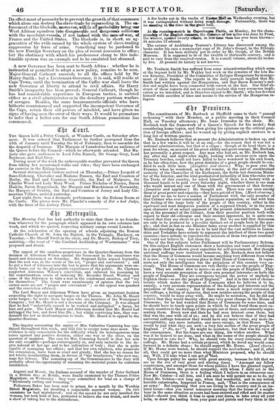ibt 31ittrovolio.
The Morning Post has had authority to state that there is no founda- tion whatever for the paragraph which appeared in its own columns last week, and which we quoted, respecting military camps round London.
At the celebration of the opening of schools adjoining the Roman Catholic Church of St John the Baptist, in the Triangle, Hackney, on Tuesday,—Mr. Sheriff Swift in the chair, and Dr. Morris, Bishop of Troy, assisting,—the toast of "the Cardinal Archbishop of Westminster" was proposed and drunk.
The appeal of the omnibus-proprietors to the Quarter-Sessions from the decision of Alderman Wilson against the 'cross-seat in the omnibuses was heard and determined on Saturday. Mr. Sergeant Byles argued learnedly, that the seat was, in the words of the act, "proper and convenient" ; and he put a host of witnesses into the box to prove that his arguments were en- tirely borne out by the pleasurable experiences of the public. Mr. Clarkson supported Alderman Wilson's conviction, and enforced his reasoning by the experimentum crucia of inducing Mr. Recorder Stuart Wortley and
\ some of the Aldermen to take a seat in the condemned omnibus, and "try
for themselves." The Court were unanimously of opinion that the two corner-seats are not "proper and convenient " ; so the appeal was quashed and the conviction affirmed.
The Lord Mayor and Alderman Wilson have given an important decision respecting the right to navigate barges on the Thames. Mr. John M. Heard owns barges ; he works them by men who are members of the Waterman'a Company ; but Mr. Heard is not a freeman of the Company. It was alleged that he had "unlawfully caused to be worked and navigated" a barge, for hire and gain. The Lord Mayor and Alderman decided that Mr. Heard had infringed the law, and fined him 20a.; but whilst convicting him, they con- demned the law as disadvantageous to trade. Mr. Heard is to appeal to the Quarter-Sessions.
The inquiry concerning the sanity of Mrs. Catherine Cumming has con- tinued throughout this week, and bids fair to occupy some days more. The evidence is only remarkable for the difficulty which its heterogeneous mass raises against any positive decision, either one way or the other, on the question of madness. The case for Mrs. Cumming herself is that her acts are only eccentric—perhaps extravagantly so, and only imbecile to the de- gree natural at her age and to her infirmities of body ; that she is quite capable of managing her affairs ; and that her own relatives, who prosecute the commission, have been so cruel and greedy, that she has no reason for not totally disinheriting them, in favour of "her benefactors," who now ma- nage her defence. The summing-up of the Commissioner to the Jury will probably afford the opportunity of resuming the material points he considers established.
Argenti and Morati, the Italians accused of the murder of Peter Getland in a British ship at Mobile, were finally examined by the Thames Police Magistrate on Wednesday : they were committed for trial on a charge of "feloniously cutting and wounding."
Policeman Baker has been sent to prison for a month by the Worship Street Magistrate, for insulting a respectable married woman. On two occasions he had misbehaved ; and on the second he not only insulted the woman, but took hold of her, pretended to believe she was drunk, and made a show of taking her to the stationhouse. A die broke out in the vaults of Exeter Ball en Wednesday evening, but it was extinguished without doing much damage. Fortunately, there was no mating at. time in .peathalf.
At Se run " h in Copenhagen Fields on Monday, for the chain-
pions * of the ZaJish runners the distance of ten miles was done by Frost, the winner, ageinst twenty others, in less time than has ever been known.- 54 minutes 12 seconds.
The curator of Archbishop Teniaon's Library has discovered among the books under his care a manuscript copy of St. John's Gospel, in the Ethiopic character. It has been skilfully put in order by Mr. Gough, of the British Museum. It is supposed to be of the twelfth or thirteenth century, and is said to vary from the received version. It is a small volume, about six inches by five. At present its history is not known.
Mr. Toulmin Smith has suffered from some misunderstanding which arose at the inquest held by Mr. Wakley last week on the remains of the late Ba- ron Kemeny, President of the Committee of Refugee Hungarians for manage- ment of their funds. The reports in the daily journals implied that Mr. Smith had written against the Hungarians, and that Baron Kenieny's sud- den end might have been connected with sorrow at the fact. Our brief ab- stract of these reports did not so entirely exclude this very erroneous impli- cation as we intended, and is therefore unjust to Mr. Smith ; who has devoted himself with sacrifice of time and means to the service of the Hungarian re- fugees.


























 Previous page
Previous page